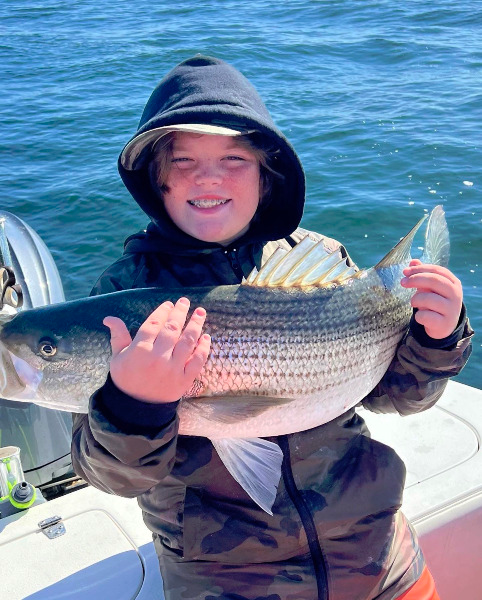Navigating Boat Etiquette and Policies for a Smooth Lake Michigan Adventure
Lake Michigan offers a thrilling boating experience where understanding local rules and etiquette transforms a good trip into a great one. This guide provides clear, practical tips and essential policies to ensure your time on the water is safe, respectful, and thoroughly enjoyable.
Always Wear a Life Jacket
Lake Michigan’s waters are unpredictable; life jackets save lives and are legally required for all passengers.
Respect No-Wake Zones
Slow down near shorelines, boat ramps, and popular spots to reduce wake impact and avoid accidents.
Use Designated Waste Disposal
Protect the lake’s environment by never dumping trash or fuel overboard; use shore-side facilities.
Communicate Clearly
Utilize marine radios as needed and signal intentions with waves or lights to maintain good relations on the water.
Navigating Boat Etiquette and Policies for a Smooth Lake Michigan Adventure

Four Hour Kids Charter
All ages • 4 hours • Up to 6 passengers
Looking for a fun and educational outdoor activity for kids? The Four Hour Kids Charter by Jersey Devil Sportfishing offers an exciting fishing adventure perfect for families. Discover the joy of fishing in the scenic waters of Fair Haven, New Jersey, with expert guidance and all gear provided.
Lake Michigan’s expansive waters invite boaters—from novices gliding gently across the surface to seasoned captains embracing the brisk winds—to experience a dynamic playground that is fiercely itself. To make your voyage smooth and safe, understanding the distinct policies and unwritten codes of dogged respect shared by Lake Michigan’s boating community is essential.
Before you even cast off, familiarizing yourself with local boating regulations is practical. State laws dictate life jacket requirements: every passenger must have one, readily accessible. Keeping a fire extinguisher, sound-producing device, and emergency kit onboard isn’t just prudent—it’s mandatory. These rules aren’t mere formalities; they protect you against the lake’s unpredictable personality.
Etiquette extends beyond compliance. Lake Michigan’s currents and waves double as silent guides, pushing boats to respect distance and speed limits near harbors and popular beaches. Operating at a safe speed near swimmers and smaller vessels minimizes wake impact, preventing accidents and preserving peace.
Communication on the water blends signal and courtesy. Use marine radios as needed but remember a friendly wave or nod when passing other boats reflects confidence and goodwill. Anchoring etiquette requires awareness: avoid obstructing channels or crowding public docks. Moor responsibly, letting others share the lake without conflict.
Launching and docking demand preparation. Busy ramps call for patience and teamwork—arrive early, have lines and fenders ready to ease maneuvering. Leave ramps clean and orderly to maintain these critical access points for everyone.
Waste disposal rules on Lake Michigan are strict. Never release trash or pollutants overboard. Use designated receptacles ashore or hold waste onboard for proper disposal, showing respect for this fiercely vibrant ecosystem.
Adapting your boat handling to weather variations is crucial. Sudden gusts can surprise; keep your hands steady and your eyes sharp. Lakeshore winds morph constantly, so plan trips around weather forecasts and remain flexible.
Finally, embracing local customs enriches your journey. Take time to observe how fellow boaters interact—there’s an unspoken bond woven through shared experiences on the lake. This blend of practical knowledge, respect, and communal spirit ensures Lake Michigan remains a space where adventure and safety flow as naturally as the waves themselves.
Nearby Trips
All Adventures
Boat Charters
Water Activities
Adventures near Milwaukee
Discover the unique and memorable adventures that make Milwaukee special.
Frequently Asked Questions
Do I need a permit to boat on Lake Michigan?
No statewide permit is required for recreational boating on Lake Michigan, but individual marinas or launch sites may charge fees or require permits for boat launching and docking.
What should I do if the weather changes suddenly on the lake?
Stay alert to weather forecasts before departure. If conditions deteriorate, reduce speed, secure loose gear, and head for shelter or shore immediately.
Are there restrictions on where I can anchor?
Yes, anchoring is often prohibited near busy shipping lanes, certain protected areas, and near some beaches. Check local maps and marina regulations to avoid fines and hazards.
How do I avoid disturbing wildlife on Lake Michigan?
Keep a respectful distance from birds nesting along shorelines and avoid waterfowl colonies. Slow down in areas marked as wildlife refuges to reduce wakes and noise.
What’s the best way to dispose of waste while on the lake?
Keep all trash and sewage onboard until you reach shore-based disposal stations. Never dump any waste into the lake—this protects water quality and wildlife habitats.
Are there recommended local boat ramps for launching?
Yes, Milwaukee Harbor and Bradford Beach ramps are popular, well-maintained access points with ample parking and services. Early arrival is advised during summer weekends.
Recommended Gear
Personal Flotation Device (PFD)
A well-fitting life jacket is mandatory and your best defense against unexpected falls into the water.
Marine Radio
Critical for communication in emergencies and coordinating with other boaters, especially in busy areas.
Weatherproof Clothing
Layered waterproof and windproof gear will protect you from sudden lake breezes and temperature drops.
Dock Lines and Fenders
Necessary for safe docking and protecting your boat from damage when mooring or rafting up.
Local Insights
Hidden Gems
- "Jones Island Pier for a quiet fishing and scenic view away from crowds"
- "Lakeshore State Park offers sheltered mooring spots with city skyline views"
Wildlife
- "Look for common loons gliding on quieter mornings"
- "Watch ospreys diving near fish-rich shallows"
History
"Lake Michigan has long been a vital route for indigenous peoples, early settlers, and commerce, with historic lighthouses like Mile Bluff guiding boats through its challenging waters."
